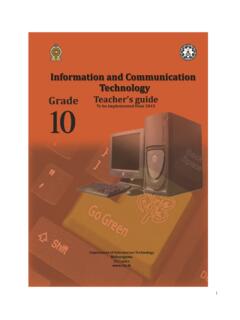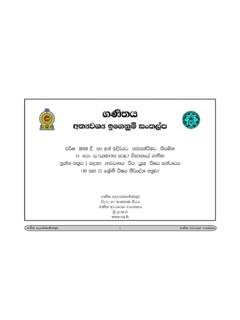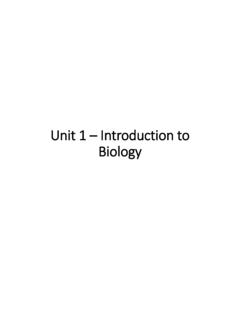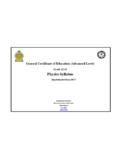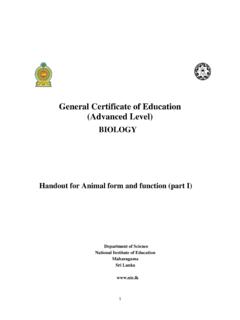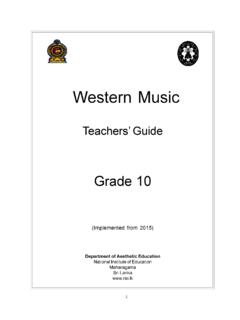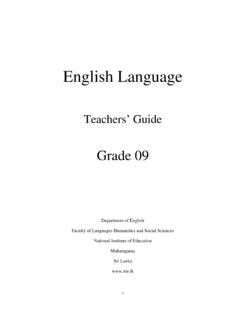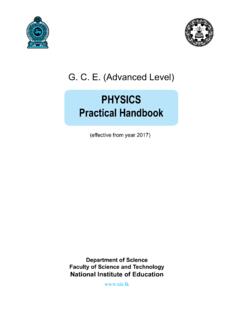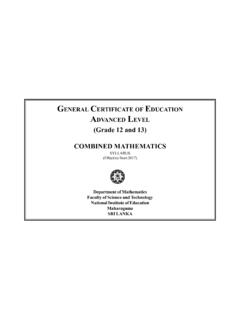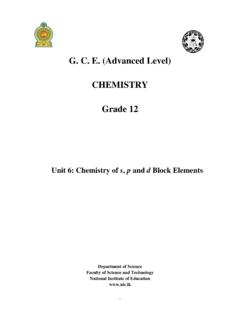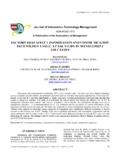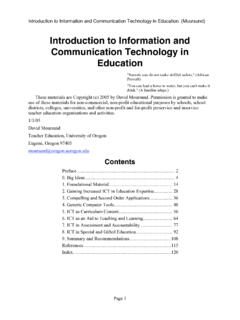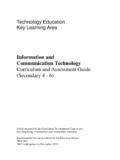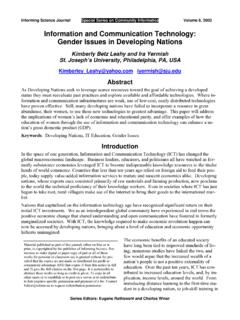Transcription of Information and Communication Technology - nie.lk
1 Information and Communication Technology Grade 11 Teacher s Guide Effective from 2016 Department of Information Technology National Institute of Education Maharagama Sri Lanka i Information and Communication Technology Grade 11 Teacher s Guide Effective from 2016 Department of Information Technology National Institute of Education Maharagama Sri Lanka ii Information and Communication Technology Grade 11 Teachers Guide National Institute of Education ISBN First Print Department of Information Technology National Institute of Education Maharagama iii Message from the Director General Teaching and Learning This Manual provides the teacher with the essentials required to implement the subject curriculum in their respective school. In implementing the curriculum, teachers must always bear in mind that their work will have paramount and far-reaching consequences for the child s cognitive achievement and behavioural development.
2 On the dimension of cognitive achievement, teachers must pay attention, inter alia, to the following where learning quality is higher: When the learner is aware of his/her life goals and the task is both relevant to goal achievement as well as abilities; When the learner is involved actively in the process of teaching/learning (student-centered process). Recall what Confucius said: What they hear, they forget; What they see, they remember; & What they do, they learn. When the learning environment is conducive, resourceful and challenging. Ensure access to study materials, equipment, labs, cases and experiences from multiple sources; and When the learner is given prompt feedback, both positive and constructive. In doing so, enable the learning to occur sequentially with higher levels of absorption, and integration with existing knowledge, skills and goals of the learner.
3 In education, expectation of the government is to enable all children in schools to reach the required levels of mastery of fundamentals of the subject matter, so that they experience the joy of achievement after facing examinations. In the dimension of behavioural development of the child, the objective of education is to link cognitive achievement with the world of work. Therefore, curriculum delivery in the hand of teacher must foster the competencies that the learner requires to possess in dealing with the world outside the school. Some of the important, generic competencies are in these areas: Industrious work ethic Positive attitudes, will to innovate, and persevere; Interpersonal relations - Teamwork, discipline, and effective Communication ; Moral values A person with integrity possessing civic values such as respect for diversity In conclusion, I wish to ask all principals, teachers and other staff in schools to look at the process of teaching and learning with attention to 4As in management: Attitude, Analysis, Action, & Accountability.
4 Start with the relevant and positive attitudes about the ends and means of what you do (your lesson, etc.); search, obtain and analyse Information in order to organize (session plans etc.); consider options and take prompt action efficiently (deliver); and monitor, assess and measure results to take accountability (ownership). I take this opportunity to wish all the teachers involved the joy of teaching and learning. Please do not hesitate to write to the relevant Head of Department at NIE, with copy to me where desirable, on your experiences and observations of this Manual. Prof. Gunapala Nanayakkara, PhD (Carleton) Director General iv Message from the Deputy Director General Education from the past has been constantly changing and forging forward. In recent years, these changes have become quite rapid.
5 Past two decades have witnessed a high surge in teaching methodologies as well as in the use of technological tools and in the field of knowledge creation. Accordingly, the National Institute of Education is in the process or taking appropriate and timely steps with regard to the education reforms of 2015. It is with immense pleasure that this Teachers' Guide where the new curriculum has been planned based on a thorough study of the changes that have taken place in the global context adopted in terms of local needs based on a student-centered learning-teaching approach, is presented to you teachers who serve as the pilots of the schools system. An instructional manual of this nature is provided to you with the confidence that, you will be able to make a greater contribution using this.
6 There is no doubt whatsoever that this Teachers' Guide will provide substantial support in the classroom teaching-learning process at the same time. Furthermore the teacher will have a better control of the classroom with a constructive approach in selecting modern resource materials and following guide lines given in this book. I trust that through the careful study of this Teachers Guide provided to you, you will act with commitment in the generation of a greatly creative set of students capable of helping Sri Lanka move socially as well as economically forward. This Teachers' Guide is the outcome of the expertise and unflagging commitment of a team of subject teachers and academics in the field Education. While expressing my sincere appreciation of this task performed for the development of the education system, my heartfelt thanks go to all of you who contributed your knowledge and skills in making this document such a landmark in the field.
7 Jayawardhana Deputy Director General Faculty of Science and Technology v Forward of the Commissioner General of Educational Publication vi Curriculum Revision Committee Guidance and Approval Academic Affairs Board, National Institute of Education Subject Coordination Mr. Maduwage Director, Department of Information Technology , Faculty of Science and Technology , National Institute of Education Mr. Perera, Seniour Lecturer, Department of Information Technology , Faculty of Science and Technology , National Institute of Education Consultation Dr. Wijayaratna, Senior Lecturer, Industrial Management Department, Faculty of Science,University of Kelaniya Dr. Wimalarathne ,Senior Lecturer, University of Colombo School of Computing Dr. Mahen Jayawardhena, Senior Lecturer, UCSC, University of Colombo Panel of writers: Internal Staff Mr.
8 Perera, Senior Lecturer, Department of Information Technology , Faculty of Science and Technology , National Institute of Education Panel of writers: External Ms. Silva, ADE(Actg.), Negambo Educational Zone Mr. Kotalawala, ISA, Homagama Educational Zone. Mr. Dayarathne, ISA, Colombo Educational Zone. Ms. Jayathileke, ISA, Kalutara Educational Zone. Mr. Kalugalarachchi, ISA, Matugama Educational Zone. Ms. Sandamali, ADE, ICT Unit, Ministry of Education Ms. Amarasinghe, Kottawa Dharmapala Vidyalaya Ms. Wijesekara, Teachers Service Kottawa Ananda Vidyalaya Mr. Anura ISA, Horana Educational Zone. Mr. Jayasinghe, ISA, Minuwangoda Educational Zone. Ms. Fernando, ISA, Piliyandala Educational Zone Ms. Delkandura ISA, Sri Jayawardhenapura Educational Zone Ms.
9 Nilushia Wickremasinghe, Teachers Service Minuwangete Maha Vidyalaya, Minuwangete Mr. Sunil, Teachers Service, K/Peradeniya, Central College, Peradeniya Language Editing: Mr. Mr. Percival, Retd. Training College Lecturer, SLEAS vii Instructions for the use of the Teachers Guide This Teachers Guide covers all competency levels of the Grade 11 ICT syllabus and is designed as relevant to the learning- teaching process. In addition to the competency levels and subject matter, some more related concepts and terms have also been highlighted. The objective is to provide the user with more in depth understanding of the syllabus. The guidance for lesson plans may be modified by the teacher to suit the relevant context. The assessment and evaluation guidance may also be modified according to the needs of the situation.
10 Quality inputs mentioned in this case are the specified websites. Guidance is provided for the preparation of lab-sheets and it is very important to involve students in laboratory practicals as these provide them with better understanding of the subject matter and could lead them to develop skills necessary to ensure a better place in the world of work that demands ICT applications. The contributions extended by Dr. Premarathne ,Senior Lecturer, University of Colombo School of Computing and Dr. L. Ranathunga, Head of the Department of Information Technology , Faculty of Information Technology University of Moratuwa in the finalization of this Teacher s Guide are very much appreciated. For laboratory practicals, following items of software are recommended.
